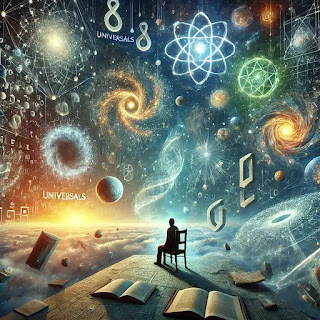Universals and the Abstract Realm
In previous posts I have talked about a hypothetical abstract realm of existence that exists independently of the physical but is projected into the physical through matter and energy that takes on the qualities and nature of these abstract forms and ideas. Many of these abstract forms and ideas are what are called "universals."
Universals are, in short, any abstract entity or "thing" that is shared by physical objects. The state of being a chair, or "chairness" shared by all objects fitting the definition of a chair is considered a universal. The quality of being green is a universal shared by all objects that are green.
Universals have been discussed since the time of Plato and Aristotle, and have represented a difficulty in philosophy that has been debated for a couple thousand years now. It is a debate on whether universals, being so abstract, actually exist. Plato argued for a realm of reality where perfect constructs of abstract forms and ideas existed independently of humans and the mind.
Schools of thought like nominalism go to the other extreme and argue the abstract doesn't truly exist, and as a result neither do universals
As for my position on the debate? I stand with platonic realism and Plato's view that abstract objects and universals do exist, and they exist independently of human beings. I simply believe humans are too restricted to the physical realm to fully appreciate the reality of the abstract realm of ideas and forms that Plato pioneered the idea of.
I believe every human mind and brain is different, and as a result I believe some of us think more abstractly than others and some of us are more grounded in the physical and need more measureable and empirical evidence for the existence of things. These less abstract thinkers and minds need to touch and measure something to confirm its reality.
The abstract thinker often tries to go beyond the physical evidence of things and into deeper, more hypothetical, and more metaphysical realms of reality. It takes a lot more imagination and creativity to think abstractly and deeply than it does to be entirely dependent on measureability.
Abstract things and those abstract realms of existence that aren't very measurable or physical are always shrouded in a level of uncertainty. As a result of uncertainty, a pure skeptic can simply deny the existence of the abstract, including universals. Whenever there is a level of uncertainty high enough to cloak aspects of something, their is always room for deniability. It's relatively easy to deny the existence of something you can't measure.
This degree of uncertainty is why the abstract realm and many abstract ideas have such a hard time gaining validity in the minds of skeptics and doubters. The uncertainty provides an avenue of criticism, doubt, or even attack. This includes the problem of universals.
I choose platonic realism because I know that just because something is shrouded in uncertainty doesn't mean it doesn't exist. Existence is a mysterious place, and with mystery comes uncertainty. It is a leap of faith for sure, but I choose to believe that their is an abstract realm of a level of complexity, depth, and power that most people cannot imagine or are too frightened to try to.
In this abstract realm, I believe there is even consciousness dwelling there that most human beings cannot understand very easily. Conscious abstract information that acts in our world through the minds of humans to achieve their goals and objectives here.
Since my belief that existence is infinite is one of the core foundations of my belief system, I believe everything must exist to some degree or another, at some point in time, and some point in space, or outside of both. I believe the abstract realm of existence is the realm where that infinite system is maximized the most. As a result, I believe universals do exist independently of the mind.
I believe that abstract realm could be even more real than this one, since abstract things are static and don't break down due to entropy and decay. The physical universe very much does, and is dying as we speak. Abstract forms, constructs, and ideas are, in their perfect ideal state, timeless and eternal. Abstract things never die, only the mold that projects them (physical objects, matter, and energy) dies over time. As a result, I believe universals are more real than the physical objects that project them are, as are all abstract forms and ideas.




Comments
Post a Comment